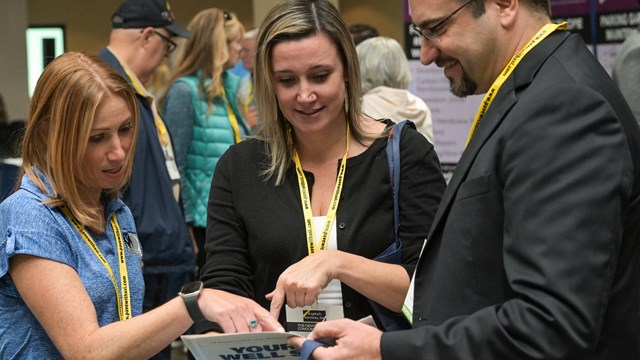Trick or treat! It’s that time of year when pumpkins are picked and decorated, costumes are chosen and all the children in the association are anxiously waiting for Halloween. But for the association, this is also a time of concern as children walk, most often after dark, throughout the property. Without the right safety measures in place children can be injured.
“We facilitate Halloween, so why not be proactive about it?” says David J. Levy, president of Sterling Services, Inc., in Holliston, Massachusetts. “We remind residents to put the lights on and be extra careful when driving to the property.” In addition to keeping the property well-lit on this fun holiday, associations should also keep the grounds clear of items, such as tools, gardening equipment, etc., that cause children or parents to fall.
But it’s also wise to remember that the association is responsible for maintaining the common elements of the property year-round, not just for an active holiday such as Halloween. As a result, if the staff has been on top of their regular maintenance duties, there should be no reason for concern.
“Most of our safety issues are generic to age, such as egresses, guard rails and hand rails,” says Levy. “We take care of the property because it’s safe for everyone, not just children.”
When kids aren’t trick-or-treating, they’re enjoying the property’s playgrounds, but these are areas of common injury among children. Bill Eckhardt, founder of ChildScapes in Marshfield, Massachusetts, says that in the last two decades the regulatory environment has become attuned to what kind of injuries are occurring on playgrounds.
“The overwhelming percentage of severe injuries that occur on playgrounds are falls to hard surfaces,” says Eckhardt. “People are under the impression that we put down rubber, sand, turf or whatever to prevent Billy from breaking his arm when he falls off the monkey bars, but the surfacing is not to prevent broken arms, but to prevent severe head trauma. When a child falls from an elevated surface the head has the most exposure, so it’s important to make sure the play area is properly surfaced and maintained.”
Eckhardt says that playgrounds should adhere to the guidelines of the American Society for Testing and Materials (ASTM) and the Consumer Product Safety Commission (CPSC) to prevent injuries.
To keep play areas safe, Eckhardt urges property managers to maintain a log of maintenance and safety checks. “Don’t wait for an accident to happen,” says Eckhardt. “Look at surfacing and visually inspect moving parts because those are the things that break. They will wear out in a matter of time, but when? Most likely when a child is using it.”
Check the playground on a routine basis, preferably on Mondays after a weekend of activity. A Certified Playground Safety Inspector (CPSI). The Certified Playground Safety Inspector (CPSI) program is offered in coordination with the National Park and Recreation Association and the National Playground Safety Institute. CPSIs are certified to inspect playgrounds for safety hazards and to ensure compliance with national standards set by the American Society for Testing and Materials and the Consumer Product Safety Commission.
“It costs approximately $500 to $700 for the annual inspection, but it’s hard to put a price on preventing an injury,” says Eckhardt.
Take Away or Restrict?
Keeping the property safe for everyone should be of paramount importance for any association, but to prevent any injuries, is it best to take away or restrict children from certain common areas?
At Summer Village at the Pond in Westford, Massachusetts, a vacation home condo development, the amenities are limited to the 18 and over crowd, including the fitness center, lodge patio, library lounge, adult pool and hot tub. At Seaglass Village in Wells, Maine, an adult-focused vacation home development (18 and up), the majority of their amenities are for those over 18, including three pools, the jacuzzi, the clubhouse, library lounge, fitness center, entertainment pavilion and sports courts.
These limitations are written in the master deeds and rules and regulations. The Summer Village master deed states “the Trustees may, by rule, enact regulations concerning the use of recreational facilities located in the Condominium.” The current rules and regulations also state that “No children under the age of 18 are allowed in the Adult Pool in the spring, nor any time during the season until after Labor Day weekend, regardless of the temperature or other conditions of the family pool or pond.” Also, “The Lodge is the private adults’ only club and central gathering place for Summer Village adults, and their adult guests. With its restaurant, bar and lounge areas, the library, screened porch and patio, it is the place adults gather with friends.”
These associations do have other amenities that are available to children. For example, there is an adult pool and fitness center and a family pool and playground. “We did this in order to protect the vacation experience,” says Howard “Chip” Hal, senior vice president of Cottage Advisors, LLC. “If you want the hustle and bustle of the family pool, you can go there. If you want to swim laps or have a more quiet experience, you can go to the adult amenities. It’s designed to allow for individual choice.”
To be on the safe side, why not just remove an amenity that is attractive to children, but may cause harm? “In Massachusetts, the board doesn’t have the authority to take away an amenity without requesting permission of the homeowner,” says Levy. “A policy requiring adult supervision for younger children is wise, but to completely exclude them from using a facility because of their age is discrimination. Check with your attorney, laws vary.”
According to Eric A. Cataldo at the law firm of Gilmartin, Magence & Ross in Boston, it is legally permissible to impose reasonable restrictions on the time, place, and location for children to occupy common areas of a condominium. “The trustees are required to act as fiduciaries for all unit owners, which means they have an obligation to act with the best interests of the beneficiaries of the trust in mind, namely the unit owners,” he explains. “Therefore, part of the trustees’ duties is to develop reasonable rules and regulations to ensure the harmony of all unit owners.
Unalienable Rights
“However, it goes without saying that those rights and restrictions must not derogate from certain inalienable rights that all citizens have,” says Cataldo. “The best advice for a condominium developer or association is to avoid age, sex, and gender restrictions and develop more content-neutral language to avoid constitutional issues and scrutiny in the court system at a later date."
For example, your building does not want children playing kickball in the hallway and management tacks up a flier that says, “No children playing kickball in the hallway.” That may be discrimination, but to tack up a flier that says, “no playing kickball in the hallway,” eliminates that problem.
Last year, a Methuen condominium association agreed to pay a $150,000 settlement on allegations it violated the Fair Housing Act. According to newspaper reports, the association issued fines of more than $500 against several families because their children were playing on the complex’s outdoor common area. The reports state that although the bylaws say that organized sport activities are prohibited except in approved areas, the association did not fine adult residents for similar rule violations. Five families filed complaints with the U.S. Department of Housing and Urban Development (HUD).
The bottom line is that it’s just best to maintain all common and play areas on a regular basis to prevent any injuries occurring.
Lisa Iannucci is a freelance writer and a frequent contributor to New England Condominium.







Leave a Comment